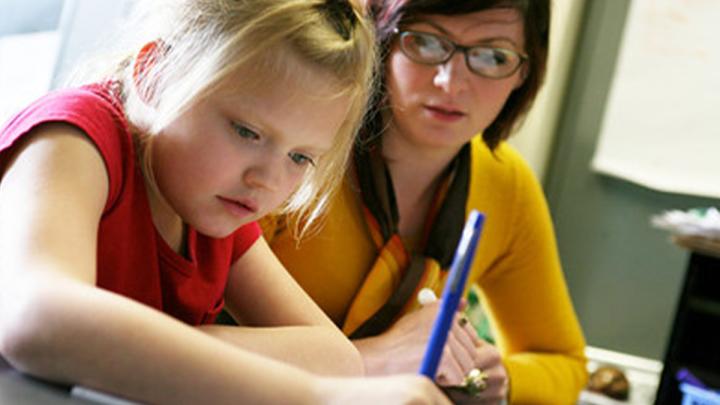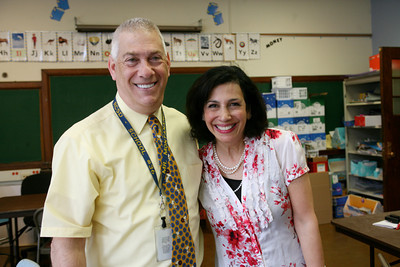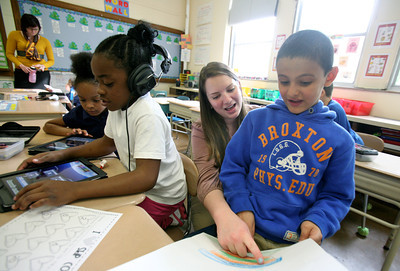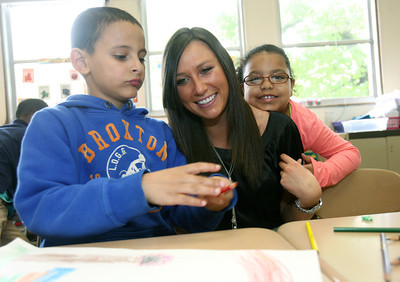
Heather Hostuttler recalls her favorite book from childhood: Jamberry by Bruce Degen. It is a book about a boy and a bear on a berry-themed adventure. Though it is torn and the spine is decaying, the book continues to travel with her everywhere she goes today.
Hostuttler, a graduate student at the University of Rochester’s Warner School of Education, has taken her love for reading and writing to Henry W. Longfellow School 36, where she is among other Warner graduate students working collaboratively with teachers and administrators at the school to build and strengthen children’s literacy skills through a new initiative, called Project READ.
“After learning about the students at School 36, I knew that this opportunity would change my career as a teacher forever,” says Hostuttler, a certified secondary education teacher pursuing a master’s and additional certification in literacy education, from birth to grade 12.
School 36, like other urban schools across the country, is a high-poverty school where students struggle with literacy achievement. Principal Paul Montanarello, a veteran school leader who has worked tirelessly to improve student achievement, has made literacy a top priority. A partnership between the Warner School and School 36 was formed in 2011 after local philanthropist and School 36 graduate Sheila Konar saw a need to help students achieve better results and decided to do something about it. Today, Project READ is funded through the generous support of Konar, who continues to volunteer her time to work with students at her alma mater.
A partnership between the Warner School and School 36 was formed in 2011 after local philanthropist and School 36 graduate Sheila Konar saw a need to help students achieve better results and decided to do something about it. Today, Project READ is funded through the generous support of Konar, who continues to volunteer her time to work with students at her alma mater.
“The demands of the curriculum and limited time in a school day, on top of worrying about testing demands, are truly overwhelming,” says former school teacher Carol St. George, an assistant professor at Warner who helps direct the literacy project at School 36. “This is a story about many schools across the country, but one that’s also being highlighted here locally.”
The project’s goal is to help children approach any literacy task with confidence and ability so that they are able to read and write better and ultimately improve their school success. Project READ, led by St. George, School 36 teachers, and a team of Warner interns who are studying to become teachers and literacy specialists, looks at literacy as it takes part in every aspect of every child’s life—from the classroom to home. For example, grocery lists are part of an authentic literacy task at home, St. George explains.
“We live in a literature-rich environment—there is literacy all around us that we can use to enhance students’ understanding and learning,” she adds. “Once kids identify what they are doing, it increases their confidence.”
The team of educators and Warner graduate students works directly with students at the school to develop literacy plans that work for and build on the strengths of each individual child. Using a planned strategic intervention—a balanced approach that consists of reading, writing, listening, and speaking, as well as authentic tests—they connect instruction to real-life literacy and opportunities in the real world. Word play, like singing songs with lyrics that rhyme, helps make everything come together for these students.
These opportunities help School 36 teachers reach the needs of more students in their classrooms and students to achieve success in reading and writing. The project also has helped students have a greater appreciation not only for their ability, but also for the use of literacy in their own life. Literacy is becoming a part of their world, where they now see themselves as writers and learners, talking about books and reading for meaning.
For graduate students like Jennifer Barrows, it was a great accomplishment to turn reluctant students into more motivated and confident readers and writers.
“Providing these students with strategies and assisting them with making connections have greatly contributed to their success,” says Barrows, who plans to become an elementary school literacy specialist. “As a result these students are now able to read at levels above their independent reading level, using strategies they have learned. It is so rewarding to see students change their attitude toward reading and writing.”
The literacy project, which first started out assisting one first-grade teacher and her students, has since expanded to kindergarten and second grade, and will follow kids into third grade starting this school year. For Warner graduate students, forming relationships with teachers and students along with building trust have helped contribute to the success of the project. “The relationships I have formed with students have made me more passionate and invested in urban teaching,” says literacy education master’s student Elizabeth Sennett. “I saw how students grew and became more dedicated to learning through their positive experiences with tutors from the project. I will continue to put students first and devote time in the classroom to building a strong community because this impacts learning significantly.”
“The relationships I have formed with students have made me more passionate and invested in urban teaching,” says literacy education master’s student Elizabeth Sennett. “I saw how students grew and became more dedicated to learning through their positive experiences with tutors from the project. I will continue to put students first and devote time in the classroom to building a strong community because this impacts learning significantly.”
A critical part of Project READ is the impact it will continue to have on preparing tomorrow’s educators to more effectively address the challenges of literacy in urban schools. Warner has a strong commitment to urban teaching and social justice. The project sets out to prepare agents of change who are going to go out into communities in need, specifically urban communities, and approach literacy instruction in a child-centered way that enhances their lives. Not only will students from School 36 benefit from this project, but it will also help future students across the country who will be served by these teachers.
The project helps to make graduate students reflective as future and current practicing teachers.
“It has prepared me for a career as a literacy educator,” says Barrows, who explains that literacy instruction is very broad-based and incorporated into all content areas. “Through this project at School 36, I have gained valuable tools for planning and implementing strategies into lessons. By identifying specific literacy needs, I am able to plan lessons around the skills that are needed.”
Initially, a couple of Barrows’ students were reluctant readers, who did not recognize the joy that reading could bring. Once she taught them strategies to use to make reading easier, they started enjoying books, she says.
According to Warner student Hostuttler, the project has helped her to learn and practice valuable skills as well as try new techniques based on specific student needs.
“I have had the opportunity to work as a co-teacher in the specialist position, instead of a classroom teacher position, which has been eye-opening and professionally valuable,” she says. “With specific regard to literacy teaching, this project has really allowed me a forum in which to grow as a literacy specialist and coach and to become familiar with specific assessments and tools of the field.”
Hostuttler reflects on one of her most memorable moments when she met with a student’s mother during field day and shared all of the strides her daughter made over the school year. Hostuttler was grateful to learn that one of her ideas for summer learning, an environmental literacy activity, is one that they continue to use at home today.
She adds, “There are few things more rewarding than to know that the work you are doing as a teacher is supporting a student and empowering his or her family.” Professor St. George says that this is a wonderful opportunity for Warner graduate students to take on leadership roles in literacy in the community. “These students are able to work in any district and make a difference and be agents of change,” explains St. George, who also has held bi-weekly professional development sessions with teachers at the school and presented a half-day workshop on literacy.
Professor St. George says that this is a wonderful opportunity for Warner graduate students to take on leadership roles in literacy in the community. “These students are able to work in any district and make a difference and be agents of change,” explains St. George, who also has held bi-weekly professional development sessions with teachers at the school and presented a half-day workshop on literacy.
St. George and educators at School 36, meanwhile, hope to build up an army of graduate students, alumni, and retired teachers to help improve literacy in our community.
“There’s a lot of talent out there,” she says, “and people who have a real desire to improve literacy and help kids learn.”